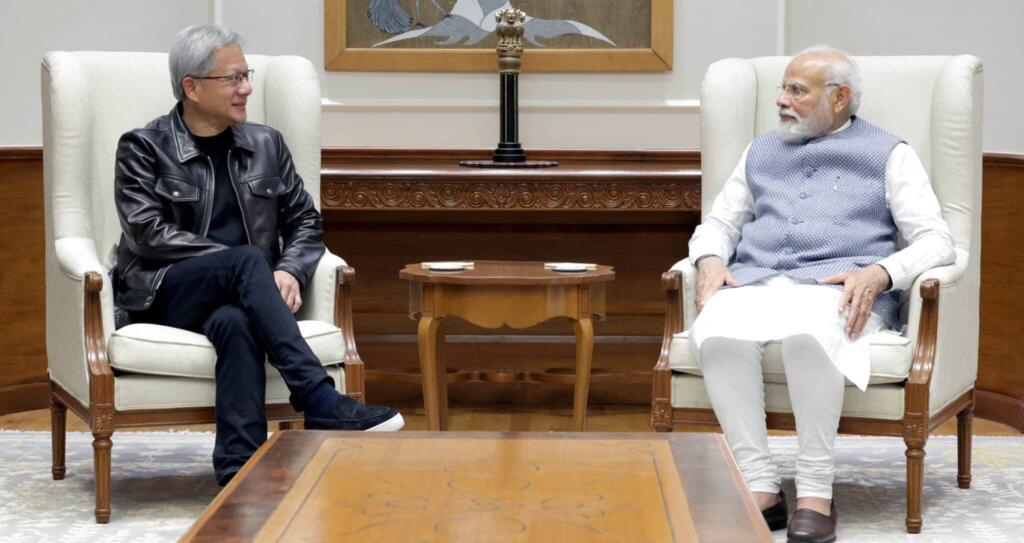The huge American tech corporation, Nvidia is looking to collaborate with India to develop a new AI chip. The company is hoping to leverage India’s talent in semiconductor design with the aim of expanding further in the country’s growing market. The CEO of Nvidia, Jensen Huang, discussed this potential partnership with Prime Minister Narendra Modi during their meeting in the US earlier this year, the report suggests.
According to reports, the proposal was made by Jensen Huang, the founder and CEO of Nvidia, to Prime Minister Narendra Modi. Nvidia’s valuation has surged as its graphics processing unit (GPU) chips have become integral to the artificial intelligence (AI) surge that’s driving the tech industry.
Nvidia is an American multinational corporation and technology company headquartered in Santa Clara, California, and incorporated in Delaware. It is a software company which designs and supplies graphics processing units (GPUs), application programming interfaces (APIs) for data science and high-performance computing, as well as systems for mobile computing and automotive market. Nvidia is also a dominant supplier of artificial intelligence (AI) hardware and software.
Nvidia’s professional line of GPUs are used for edge-to-cloud computing and in supercomputers and workstations for applications in fields such as architecture, engineering and construction, media and entertainment, automotive, scientific research, and manufacturing design. The Santa Clara, California-based company has seen its market cap zoom past that of giants like Microsoft and Alphabet in a short period of time. At $3.39 trillion, it is now only marginally behind $3.57 trillion of Apple, the world’s most valuable company.
CEO Huang will be visiting India later this week in his annual trip to the country. During his visit in September last year, Huang had met PM Modi where both discussed the potential India offers in the world of AI.
Confirming the development, Ashwini Vaishnaw, union minister for electronics and IT, told ET, “Yes, we are discussing with Nvidia the development of an AI chip, discussions are at a preliminary stage.” Officials said Nvidia wants to use India’s huge chip designing base and develop an India specific chip. “The government is currently thrashing out the details such as costing, benefits, use cases of such a co-developed chip,” one of them said.
Officials said in case of a co-developed chip, the core chip will be designed by Nvidia’s chip design partners such as Arm or AMD while the top 10-20% layer, which is being customised, can be designed by government-owned Centre for Development of Advanced Computing (C-DAC) or a private chip design company in India. They said Nvidia’s proposal stems from effectively utilising the large number of chip designers in India.
According to official reports there are only two countries in the world who can co-develop the chip, and they are India and Germany. India is the current top choice due to the sheer size of the talent available in chip design, which no other country can offer.
According to a recent Boston Consulting Group (BCG) study, 19% of the world’s chip designers are based in India. Most of them possessing highly advanced skills are employed by the back-office arms of the world’s top chip designing firms which manufacture the chips elsewhere which are subsequently imported to India for use in various electronics items. Experts have been calling on the Indian government to create an end-to-end ecosystem encompassing indigenous chip design and manufacturing to resolve this scenario.
“India is home to some of the world’s greatest computer scientists. This is a great opportunity. AI is also a new industry, a new manufacturing industry that is very important,” Huang had said after meeting PM Modi in the US earlier this year. “I am looking forward to partnering with India in a very deep way to make that possible. We have many partnerships with India. AI has democratised computing. This is India’s moment. You have to seize the opportunity.”
